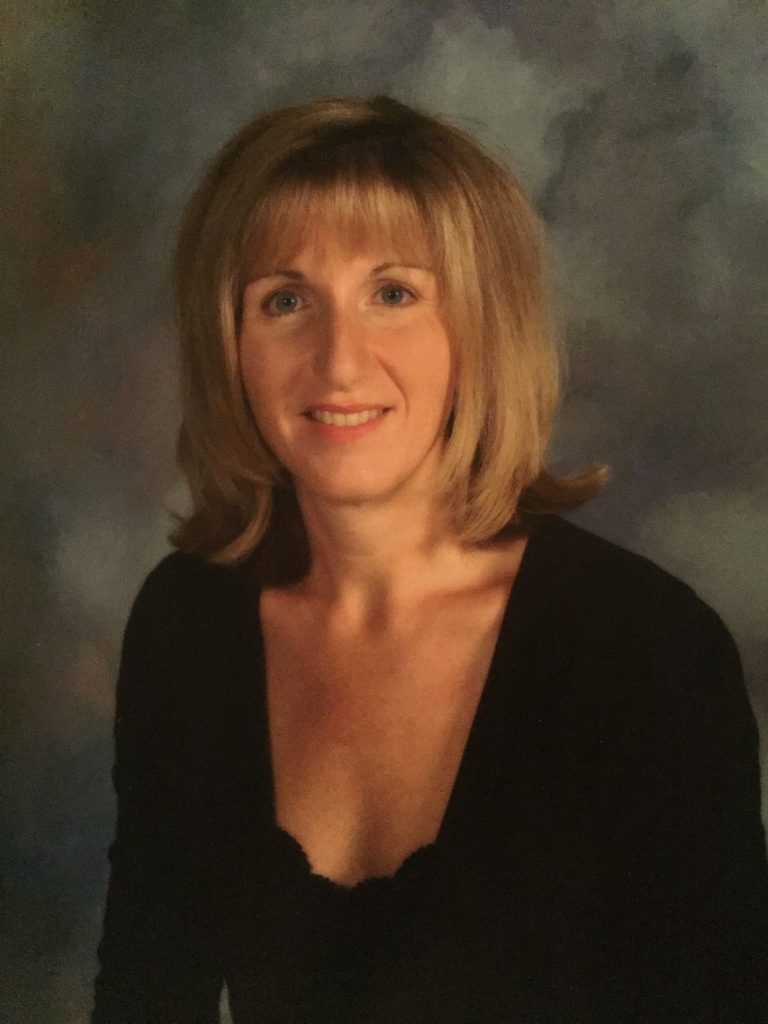Music expresses that which cannot be put into words and cannot remain silent.
Victor Hugo
About Humann Elementary Vocal Music Teacher Julie Wilson

My name is Julie Wilson and I have been teaching music since 1993. I have been at Humann Elementary since 2001. Throughout my years of teaching, I have taught band grades 5-12 and vocal music grades K-6, as well as preschool and ELL music classes. Prior to coming to Lincoln, I taught in Columbus, Nebraska, and Mesa, Arizona. I graduated from the University of Nebraska in Lincoln in 1993 with a Bachelors’s in Music Education. Go Big Red! While at the university I performed with the UNL Marching Band, Women’s Chorale, Wind Ensemble, Concert Band, and Oratorio. I received my Masters Degree from Northern Arizona University in 1997, and a second Masters in Educational Leadership from UNL in 2021. I am also certified level II in Orff-Schulwerk.
I am very excited to share my love of music and performance with all of the students at Humann Elementary. I strive to teach students not just singing and musicianship but also to foster enjoyment in music, promote self-expression and confidence, teach discipline and ignite a passion for music for a lifetime. I also know that music is beneficial in motor coordination and brain development, and that the skills learned in music translate to many other areas of life.
My husband is in the military and we have 3 children together. We enjoy spending time with our family and following our children to their many activities. I enjoy running to keep in shape and enjoy participating in some of our local races. I love to travel and explore new places. I can’t wait until my next adventure. Cheering on the Huskers is another favorite pastime in the fall.
If you have questions regarding the music curriculum or would like to know more about music at Humann feel free to contact Mrs. Wilson at jwilson@lps.org
Music Curriculum
Students will develop and apply knowledge and skills to CREATE, PERFORM, and RESPOND to music, while making CONNECTIONS to human experiences.
- PERFORMING: singing, playing instruments, moving and dramatizing
- CREATING improvising and creating rhythms, melodies, movements and songs
- RESPONDING identify and describe how elements of music are used by a performer or creator.
- CONNECTING Connect music to personal experiences, historical and cultural contexts, the arts and other disciplines.
ELO (Essential Learning Outcomes)
Kindergarten
By the end of kindergarten, the students will be expected to….
- sing alone or with others a capella or with accompaniment.
- maintain a steady beat.
- identify and play various pitched and no-pitched instruments with the correct technique.
- to read create and perform quarter note and quarter rest rhythm patterns.
First Grade
By the end of first grade, the students will be expected to….
- sing alone or with others a capella or with accompaniment.
- read, create and perform quarter note, quarter rest, and two eighth note rhythm patterns.
- play a steady beat or blocked bordun on the mallet instruments.
- will be able to identify the symbols for the treble clef, music staff, piano and forte. Students will also create and perform using piano and forte dynamics.
Second Grade
By the end of second grade, the students will be expected to….
- sing alone or with others a capella or with accompaniment.
- read, create/notate and perform quarter note, quarter rest, two eighth note, half note, half rest, whole note, and whole rest rhythm patterns.
- identify and perform songs in verse and refrain or verse and chorus form.
- visually identify the families of instruments in the symphony orchestra.
- compose or arrange shorts songs or instrumental pieces.
Third Grade
By the end of third grade, the students will be expected to….
- sing partner songs and rounds.
- read, notate, create and perform a four beat rhythm pattern using 16th notes and single eighth note/rest and all previous note/rest rhythm patterns.
- differentiate between major and minor tonalities.
- visually identify the line and space note names, and draw whole notes on the treble staff.
- compose or arrange short songs or instrumental pieces.
Fourth Grade
By the end of fourth grade, the students will be expected to….
- sing partner songs, rounds, canons and Heritage School Songs.
- read, create, notate and perform an eighth note followed by two 16th notes, and two 16th notes followed by an eighth note, and all previous note/rest rhythmic patterns.
- play a minimum of three notes on the recorder with a good tone.
- identify, describe and discuss the tempo markings: adagio, moderato, allegro and presto.
- have listened to and studied the repertoire for the current Lincoln Symphony’s Young Person’s Concert.
- compose and play a four measure piece for recorder utilizing the notes and rhythm patterns previously learned.
Fifth Grade
By the end of fifth grade, the students will be expected to….
- sing and define counter melody and descant in vocal literature.
- be able to use music terminology to discuss the similarities and differences between the genres of Opera and Musical Theater.
- be able to use music terminology to discuss the similarities and differences between the genres of American music which could included Ragtime, 12 Bar Blues, Jazz, Big Band, Country, Folk, or Rock and Roll.
- I can sing and play the 12 bar blues baseline pattern.
- Compose and perform a layered rhythmic composition.
- I can improvise using scat syllables
What’s Happening In…
Kindergarten
The kindergarten students will begin their journey with music with many fun singing games. We will be exploring their singing, speaking, whispering, and emergency voices. As students begin to distinguish their singing voice from the others we will work on matching pitch with simple melodies. We will also experience the contrasts of loud and soft, fast and slow, high and low and same and different. Throughout the year we will learn about and perform on various unpitched percussion instruments. We will also learn to read quarter notes, rests and C, D, and E on the treble clef.
First Grade
The first-grade students will be continuing to work on their singing voices alone and with others. We will continue to play and learn about the unpitched percussion instruments and their families the woods, metals, and skins. In addition to experiencing contrasts in music, we will also begin to label these contrasts with musical terms. We will continue to work on our music reading skills with the addition of F and G on the treble clef, and new rhythm including eighth notes. Students will begin to experience harmony through the use of ostinati (repeating patterns). Finally, students will gain some experience composing and creating in class. The first grade also performs the musical “This Old Gingerbread House”. More information will be shared about this fun opportunity.
Second Grade
The second grade students will continue to work on developing their first instrument, the voice. Instrument skills will also continue to be developed on the unpitched instruments and we will begin to learn about the families of orchestra instruments. This includes the percussion, strings, brass, and woodwind families. New musical terms will be taught as we experience more complex music. We will also begin to focus on musical patterns called form. Our music reading skills will take off with the introduction of all the space notes within the treble clef and the addition of the half notes, whole notes, and corresponding rests. Harmony will be explored through the use of multiple ostinati, and rounds. Students will continue to have the opportunity to create music of their own within certain parameters.
Third Grade
The third grade students will continue with their first instrument, the voice but will also be developing their skills on the xylophones this year. We will continue to review expressive musical terms and explore more complex aspects such as major and minor. Students will continue to focus on musical patterns and create music to fit specific patterns. Students will learn to read all notes in the treble clef. Reading rhythms and notes will be applied this year on the xylophones. The addition of sixteenth notes, single eighth notes and syncopation will continue to challenge our reading skills. Harmony will continue to be explored through ostinati, rounds, and partner songs.
Fourth Grade
The fourth grade students will continue to focus on developing their musicianship skills with their singing voice and xylophones. A highlight of the year is the recorder unit where students also get to apply their acquired music reading skills. We will continue to review and experience expressive terms within the music and focus on terminology for various tempos (speed) of music. The addition of dotted quarter notes and eighth note/sixteenth note combinations will continue to challenge their rhythm skills. We will continue to experience harmony through ostinati, partner songs and rounds. We will also listen to four-part music (soprano, alto, tenor, bass) to experience more complex harmonization. During the fourth grade year, we study the development of the symphony orchestra and its music. This unit concludes with a field trip to the Lied Center to watch the Lincoln Symphony Orchestra perform. A second mini unit deals with the music of the early pioneers and concludes with the Heritage School field trip.
Fifth Grade
Fifth-grade students will continue to focus on their first instrument, their singing voice as well as classroom instruments. We will be applying our knowledge of music terminology, form, rhythm and pitch skills to read scored multi-part music. The addition of triplets, dotted eighth note with sixteenth note combinations and syncopation will continue to challenge us rhythmically. We will continue to explore singing ostinati, rounds, and partner songs but will also add counter melodies and practice part reading. Several unit studies will be a part of our school year including Opera/Musical Theatre, Jazz Music, and a mini-unit on the acoustic guitar if time allows. As part of the musical theatre unit we will be watching the musical “Westside Story”. During the Jazz unit, student groups will create a blues song to perform for the class. The guitar unit will consist of learning about the guitar as well as playing some simple melodies and chord progressions.




